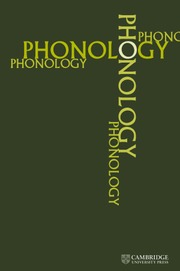Crossref Citations
This article has been cited by the following publications. This list is generated based on data provided by
Crossref.
Blevins, Juliette
2006.
Reply to commentaries.
Theoretical Linguistics,
Vol. 32,
Issue. 2,
Clements, G.N.
2006.
Encyclopedia of Language & Linguistics.
p.
433.
Kenstowicz, Michael
and
Suchato, Atiwong
2006.
Issues in loanword adaptation: A case study from Thai.
Lingua,
Vol. 116,
Issue. 7,
p.
921.
MUKHERJEE, ANIMESH
CHOUDHURY, MONOJIT
BASU, ANUPAM
GANGULY, NILOY
and
CHOWDHURY, SHAMIK ROY
2008.
REDISCOVERING THE CO-OCCURRENCE PRINCIPLES OF VOWEL INVENTORIES: A COMPLEX NETWORK APPROACH.
Advances in Complex Systems,
Vol. 11,
Issue. 03,
p.
371.
Hyman, Larry M.
2008.
Universals in phonology.
The Linguistic Review,
Vol. 25,
Issue. 1-2,
Downing, Laura J.
2009.
On pitch lowering not linked to voicing: Nguni and Shona group depressors.
Language Sciences,
Vol. 31,
Issue. 2-3,
p.
179.
Balas, Anna
2009.
Natural Phonology as a Functional Theory.
Poznań Studies in Contemporary Linguistics,
Vol. 45,
Issue. 1,
Brunelle, Marc
2009.
Tone perception in Northern and Southern Vietnamese.
Journal of Phonetics,
Vol. 37,
Issue. 1,
p.
79.
Kim, Eun-Sook
and
Pulleyblank, Douglas
2009.
Glottalization and Lenition in Nuu-chah-nulth.
Linguistic Inquiry,
Vol. 40,
Issue. 4,
p.
567.
Patri, Sylvain
2009.
La perception des consonnes hittites dans les langues étrangères au XIIIe siècle.
Zeitschrift für Assyriologie und vorderasiatische Archäologie,
Vol. 99,
Issue. 1,
Mielke, Jeff
2009.
Segment Inventories.
Language and Linguistics Compass,
Vol. 3,
Issue. 2,
p.
700.
Naidoo, Shamila
2010.
A re-evaluation of the Zulu implosive [ɓ].
South African Journal of African Languages,
Vol. 30,
Issue. 1,
p.
1.
Best, Catherine T.
and
Hallé, Pierre A.
2010.
Perception of initial obstruent voicing is influenced by gestural organization.
Journal of Phonetics,
Vol. 38,
Issue. 1,
p.
109.
Mukherjee, Animesh
Choudhury, Monojit
Basu, Anupam
and
Ganguly, Niloy
2010.
Modelling the Redundancy of Human Speech Sound Inventories: An Information Theoretic Approach.
Journal of Quantitative Linguistics,
Vol. 17,
Issue. 4,
p.
317.
Hallé, Pierre
2010.
Obituary: George Nick Clements.
Journal of Phonetics,
Vol. 38,
Issue. 1,
p.
1.
Hyman, Larry M.
2010.
Phonologist, Africanist, typologist: George N. (Nick) Clements (1940–2009).
Linguistic Typology,
Vol. 14,
Issue. 1,
Clements, G.N.
and
Hallé, P.A.
2010.
“Phonetic bases of distinctive features”: Introduction.
Journal of Phonetics,
Vol. 38,
Issue. 1,
p.
3.
Hall, Daniel Currie
2011.
Phonological contrast and its phonetic enhancement: dispersedness without dispersion.
Phonology,
Vol. 28,
Issue. 1,
p.
1.
Mielke, Jeff
2011.
The Blackwell Companion to Phonology.
p.
1.
Riehl, Anastasia K.
and
Cohn, Abigail C.
2011.
The Blackwell Companion to Phonology.
p.
1.




